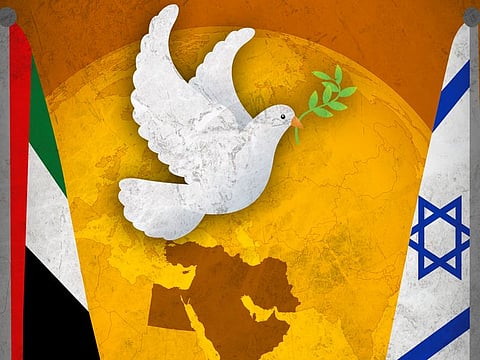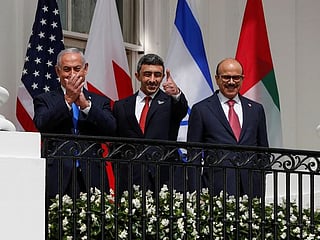UAE-Israel partnership will advance peace in Middle East
Security, prosperity and peace can come only through courageous leadership and dialogue

Also In This Package
UAE-Israel peace deal signing ceremony in pictures

UAE: Tadej Pogacar brings Tour de France victory home

Dubai is home for these stars from across the world

Emmy’s 2020: Hazmat suits, Friends reunion and more

The uplifting scenes at the signing of the Abraham Accords on the White House lawn, in which Israel’s Prime Minister joined Emirati and Bahraini leadership in affirmation of peace marked an important and historic step toward regional reconciliation and a more stable and flourishing Middle East. Now it is clear: security, prosperity and peace can come only through courageous leadership, mutual acceptance, and dialogue.
For Israelis of all backgrounds, religions and ethnicities, this was a resounding manifestation of our national quest for peace. Older Israelis were reminded of the Camp David Accords with Egypt; others recalled the peace treaty with Jordan; millennials from both sides immediately embarked on joint ZOOM sessions, posting mosaics of young Israelis, Emiratis and Bahrainis on the social networks, discussing the new day.
Last week’s ceremony was history in the making; now it is our shared goal to rise to the occasion. We must strive to build partnerships to advance our region, bring additional countries to join the circle of peace, including the Palestinians, and confront extremists and aggressors. Together we can do it

UAE Minister of Foreign Affairs and International Cooperation Abdullah bin Zayed al-Nahyan declared it was time to “extend a hand of peace and receive a hand of peace.” In the spirit of Israel’s Proclamation of Independence, we are delighted and honoured to accept your outstretched hand. As a member of the Israeli government, I look forward to the ratifying of these agreements.
This new day will bring with it tangible benefits for all sides. In addition to the common fight against COVID-19, the states in our region are confronted with immense challenges but also great opportunities: water management, environment, energy, security, health, technology, and tourism, to name some.
Also Read: The dawn of a new era in the Middle East
Israel’s Weizmann Institute of Science and the UAE’s Mohamed bin Zayed University have already signed a memorandum of understanding. With the unique expertise that each side brings to this partnership, we can grow and flourish together.
Joining hands against extremism
This moment also allows us to face common threats with a united front. Not surprisingly, Iran, Hezbollah, Hamas, and members of the anti-Israel delegitimization campaign came out against peace and normalisation.
The UAE’s decision to abolish its Boycott Law, as well as the Arab League’s decision not to condemn the peace deal, serve as strong messages: the days of boycotts are behind us; now we stand ready to join hands against terror, extremism and aggression.
Abraham Accords
The Accord was initially agreed to in a joint statement by the US, Israel and the UAE on August 13, 2020. The treaty was formally signed on September 15, 2020 at the White House
History teaches us that mutual acceptance is indispensable to advancing reconciliation in our region. When recognised and given assurances for their security, Israelis feel more ready to take risks and make concessions for peace.
Those who genuinely wish to promote peace should invest in legitimisation, understanding, and dialogue. In contrast, those trying to divide us by building walls of hate, alienation and lies should be denounced for what they are: extremists or detractors of peace.
Last week’s ceremony was history in the making; now it is our shared goal to rise to the occasion. We must strive to build partnerships to advance our region, bring additional countries to join the circle of peace, including the Palestinians, and confront extremists and aggressors. Together we can do it.
MK Orit Farkash-Hacohen is Israel’s Minister of Strategic Affairs and a member of Israel’s National Security Cabinet






